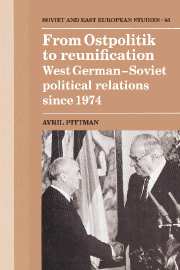Book contents
- Frontmatter
- Contents
- List of tables
- Preface
- Note on text
- Chronology
- Introduction
- 1 The Second World War and its aftermath, 1945–1974
- 2 Ethnic Germans
- 3 Berlin
- 4 The Federal Republic of Germany's relations with the German Democratic Republic
- 5 INF, Afghanistan and the post-Afghanistan period
- 6 Assessment of the Federal Republic of Germany's relations with the Soviet Union, 1974–1982
- 7 The Federal Republic of Germany's political relations with the Soviet Union after 1982
- Appendices
- Notes
- Bibliography
- Index
- Series list
3 - Berlin
Published online by Cambridge University Press: 12 October 2009
- Frontmatter
- Contents
- List of tables
- Preface
- Note on text
- Chronology
- Introduction
- 1 The Second World War and its aftermath, 1945–1974
- 2 Ethnic Germans
- 3 Berlin
- 4 The Federal Republic of Germany's relations with the German Democratic Republic
- 5 INF, Afghanistan and the post-Afghanistan period
- 6 Assessment of the Federal Republic of Germany's relations with the Soviet Union, 1974–1982
- 7 The Federal Republic of Germany's political relations with the Soviet Union after 1982
- Appendices
- Notes
- Bibliography
- Index
- Series list
Summary
It is undoubtedly one of the achievements of détente that the international situation of Berlin became one of calm and that the city was no longer the barometer of East–West relations. As a result of the 1971 Quadripartite Agreement on Berlin the situation of the city was stabilised and the city removed from the world's present-day crisis register. Postwar developments have clearly shown how changes in the East–West relationship were reflected in Berlin, the most sensitive spot in Central Europe. East–West tension in Africa since the middle seventies, the worsening of East–West relations since the NATO double-track decision and Soviet intervention in Afghanistan in 1979, the crisis in Poland – the city reflected none of these. The Four Power Agreement held, Berlin remained calm, to all intents and purposes an island of détente. Once the situation in and around Berlin had become stabilised, the city was no longer a ‘disturbance factor’ for international security. Tension was reduced round this potential trouble spot in the centre of Europe and this helped to bring about a decisive improvement in the political climate of Central Europe.
However, although there were no great crises in and around Berlin after 1972 and the Four Power Agreement regulated the most troublesome questions and brought great practical improvements, the conflict between East and West over Berlin had not so much been overcome as undergone a change. The legal and political problems carried on after 1971 but it was not so clearly perceptible from the outside as there were no crises. Each side interpreted the Agreement differently, which in practice repeatedly led to tension and controversy even though the scale and intensity of the conflict had changed.
- Type
- Chapter
- Information
- From Ostpolitik to ReunificationWest German-Soviet Political Relations since 1974, pp. 32 - 62Publisher: Cambridge University PressPrint publication year: 1992



